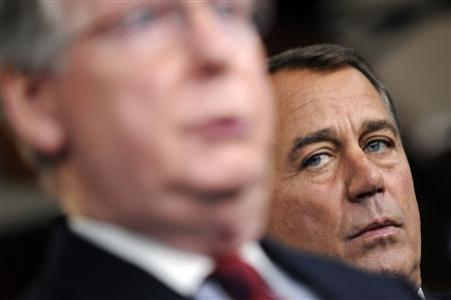White House signals compromise on tax cuts

House Republican Leader John Boehner
(R-OH) (R) listens to Senate Minority Leader Mitch McConnell (R-KY) (L)
answer questions during a news conference after sweeping Republican
gains in midterm elections, at the U.S. Capitol in Washington, November
3, 2010.
REUTERS/Jonathan Ernst
(Reuters) - A conciliatory White House said on Thursday it was willing to negotiate with Republicans on tax cut extensions, but Senate Republican leader Mitch McConnell took a hard line against compromises with President Barack Obama in a new Congress.
In the first possible policy shift since Democrats suffered heavy election losses two days ago, White House spokesman Robert Gibbs signaled Obama was open to talks on a temporary extension for the wealthy of Bush-era tax cuts that expire at the end of the year.
The fight over tax cuts looms as one of the biggest clashes since the election between Obama and Republicans, who will control the House of Representatives in the new Congress that convenes in January.
Obama invited top leaders from both parties to a meeting and a dinner at the White House on November 18, and he said the tax cuts will top the agenda.
Obama has insisted on keeping the tax cuts for families making less than $250,000, but let them expire for wealthier Americans, while Republicans want them extended for all income levels. If no agreement is reached, all Americans will see higher tax rates on January 1.
But White House spokesman Robert Gibbs said the president was willing to discuss keeping all lower tax rates, at least temporarily.
"He'd be open to having that discussion and open to listening to what the debate is on both sides of that," Gibbs told reporters, later emphasizing the cuts for high earners would not continue forever.
"The president does not believe -- and I think would not accept -- permanently extending the upper-end tax cuts," Gibbs said.
NO MOOD TO COMPROMISE
Republican leaders did not directly respond to the White House comments on tax cuts, but in a morning speech at the Heritage Foundation McConnell made it clear he was in no mood to compromise with Obama.
McConnell defended his earlier remarks that his top priority would be ensuring Obama is a one-term president and said Republicans would try to repeal Obama's sweeping healthcare overhaul but might have to settle for smaller changes.
"Some have said it was indelicate of me to suggest that our top political priority over the next two years should be to deny President Obama a second term in office," McConnell said.
"But the fact is, if our primary legislative goals are to repeal and replace the health spending bill, to end the bailouts, cut spending and shrink the size and scope of government, the only way to do all these things is to put someone in the White House who won't veto any of these things," he said.
The broad election triumph by Republicans on Tuesday changed the political calculation for both parties, emboldening Republicans who gained at least 60 House members and six more senators and forcing the White House to reconsider its approach. As of Thursday, the Democrats held 51 Senate seats with Sen. Patty Murray's projected win in Washington state.
During the weeks before the election, Obama campaigned against extending tax cuts for high-earners, saying the United States could not afford the $700 billion it would cost over 10 years while trying to tame the budget deficit.
But the White House could bend in order to ensure tax cuts for middle class Americans -- a key constituency before his own 2012 re-election bid -- also continue.
"We have to act in order to assure that middle class families don't see a big tax spike because of how the Bush tax cuts have been structured," Obama told reporters during a meeting with top Cabinet officials at the White House.
"It is very important that we extend those middle class tax provisions," he said.
INVESTOR TAXES
A compromise on extending all of the Bush-era tax cuts would include extension of lower rates on dividends and capital gains, now taxed at 15 percent.
Obama proposes to raise those taxes for high-earners to 20 percent in 2011. If Congress fails to act before December 31, the rates for dividends for high earners jumps to 40 percent, a prospect worrying some companies and investors.
Republicans signaled their determination to push the issue of an across-the-board tax cut extension.
"On the economy, we will work hard to ensure Democrats don't raise taxes on anybody, especially in the middle of a recession," McConnell said.
He also said Republicans would work in the House to deny funds for implementation of the healthcare overhaul and in the Senate to remove some of its provisions.
"If the administration wants cooperation, it will have to begin to move in our direction," McConnell said.
Eight leaders were invited to the November 18 White House meeting, including John Boehner, who is expected to be the next speaker of the House of Representatives, and Nancy Pelosi, a Democrat, who holds that position now.
Boehner, who did not directly address the tax issue, said on Thursday Obama was off the mark when he said the election results were a reflection of frustration by Americans at the sour economy and an appeal for the two parties to work together.
"When you have the most historic election in over 60, 70 years, you would think the other party would understand that the American people have clearly repudiated the policies they've put forward in the last few years," Boehner said.
(Writing by John Whitesides; Editing by Jackie Frank)